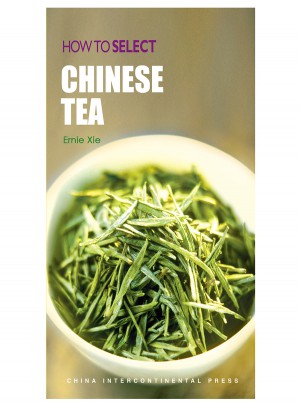

外國人選購中國茶的實用指南,圖文并茂,方便攜帶,實用性強。 “How to Select” series give you all the information you need to choose and buy jade, embroidery, tea, souvenirs, calligraphy and paintings in China with confidence. One in a series of three titles, it explains clearly and simply what to look for, where and how to shop in China, and questions you should ask. Great tips, price guides and cautionary advice ensure that you get the best value for your money.
Why Chinese Tea?
Turn a Leaf
In the Beginning —— The Holy Farmer
Costly Medicine
A Scholarly Beverage
Drink of the Gods
Tea Culture Comes of Age
Tea Olympics
Invasion and Adaptation —— Tea Institutionalized
Tea Comes West
The Teahouse
Coffee or Tea?
A Cure for Life
Old is New Again
Tea-Mind-Body Connection
Categories of Tea
Green Is Gold
Black Power
Nothing Wrong with Wulong
White Makes Right
Table Talk
Tea Cultivation
Tea Producing Areas
One Plant, Sixty-Two Leaves, Ten Thousand
Days' Pleasure
Sharp Eyes
Green Teas
Black Teas
Wulong
White Teas
Red Teas
A Word on Un-Teas
Cupping, or How to Sound Like an Authority
Tea Ceremony & Teasets
Tea Ceremony
Old Tea Ceremony
The Chinese Wedding Tea Ceremony
Choosing Tea and Water
Basics
The Tea Set
Seven Habits of Highly Successful
Tea Ceremonies
Food Pairing
Shopping Spots
Shopping for Tea, Stopping for Tea
Making the Most of It: A Visit to Maliandao
A Modern Tea Market
A Royal Tea Garden
Tea Pictures
A Lady's Business
Eleven Trustworthy Teashops
The Next Big Market
The Granddaddy of Them All
If Time Is an Issue
Index: China Tea Markets and Teahouses
Appendix
A Little Mandarin Never Hurt Anyone
Watch Your Tone
At the Teahouse
At the Tea Market
20 Essential Tea Words and Phrases
Tea CeremonyThe problem with translation is not so much in the words as in the connotations we associate with them. The average Westerner hears “ceremony” and pictures stiff formalism and unmoving expressions, a delicate procedure in which a mistake means loss of face, and comfort is the last thing on participant’s minds. Enough Chinese people to fill Europe and North America partake in what may be called a tea ceremony whenever they can. Though China certainly has its share of formalism and stringent ritual in its cultural canons, the phrase “tea ceremony” means rest, relaxation, and fun. Most importantly, it’s a time-honored method for making the most of your tea.Best of all, acquiring your own tea ceremony skills and style is part of the process of buying tea in China. The Chinese marketplace, for whatever reason, dictates that all purveyors of a particular product mass together, in cavernous buildings or crowded bazaars. They besiege the shopper with row after row of small stalls and stores that generally do not vary much. They face each other across tiny walkways where one may pass comfortably alone, but are usually peopled three abreast. The proprietor does her own marketing, inviting all and sundry, some with an aggressive tug of the shirt, others with a friendly acknowledgment, after making eye contact.Our appendix lists the best teahouses and markets for whatever city you’re in, but know that they’re pretty much all the same. However, this does not mean boredom, but convenience. Whichever one you visit will offer tea in grade from sublime to mediocre, and will follow the same rule: the customer is god. Any teashop you step into will feature a host who is only too happy to have you sit down and have a quick cuppa, or while the day away sampling different teas.Whatever you do, don’t sweat the cross-cultural small stuff. The Chinese are marvelous at picking up on subtle emotional clues, and will know if you’re tired or stressed, gregarious or reserved, serious or convivial. They will want to know where you’re from, and if you want to hold forth, every last detail about your life. Nobody’s business? Not a problem. They also want to tell you anything you want to know about tea, and a lot you didn’t know that you should know . At the end of your visit, whether you’ve drunk so much as to float a container ship or just pantomimed a few pleasantries, there’s no pressure to buy. What kind of shopping could be more pleasant? Please see Appendix 1 for a brief guide to making it even more so.
慢
圖書內(nèi)容很詳細,字跡清晰,紙張很好,我家人很喜歡!
非常滿意,很喜歡
送貨巨慢。內(nèi)容比較老。僅能做熟悉英語茶用語。
老師推薦的科普系列叢書,孩子正在慢慢看,希望能對他今后的學(xué)習(xí)有幫助。
當當網(wǎng)的客服都是人渣。我另外買了兩本書,當時怕收件時人不在家,想讓快遞送到大堂,就提前支付了。我是3月31日下的單面,當當是4月1日出貨。沒想到到今天快半個月了,快遞顯示一直是:4月2日發(fā)往廣州的途中。打了幾次電話給客服,我想退款,只是說要等快遞到了才退款,他們會攔截快遞,攔了半個月還是沒有回音。每次都是費話。有幾次我明確中午十二點打電話給我,他們卻偏偏在我工作時打(我工作時是不能接電話)。請各位朋友,千萬不要選擇提前支付貨款,付了他們就不理你的訂單,真是騙財?shù)囊环N手段啊。
從圖片上沒看出來,這本書比一般的圖書要小,是那種口袋型的圖書。印刷排版內(nèi)容都還不錯,只是里面有些信息不準確,比如說各種茶的價格范圍,龍井比碧螺春便宜,太平猴魁最貴才700多一斤,這樣很容易給外國人誤導(dǎo)。另外,里面示范泡茶的茶藝師形象欠佳,影響茶藝的欣賞。